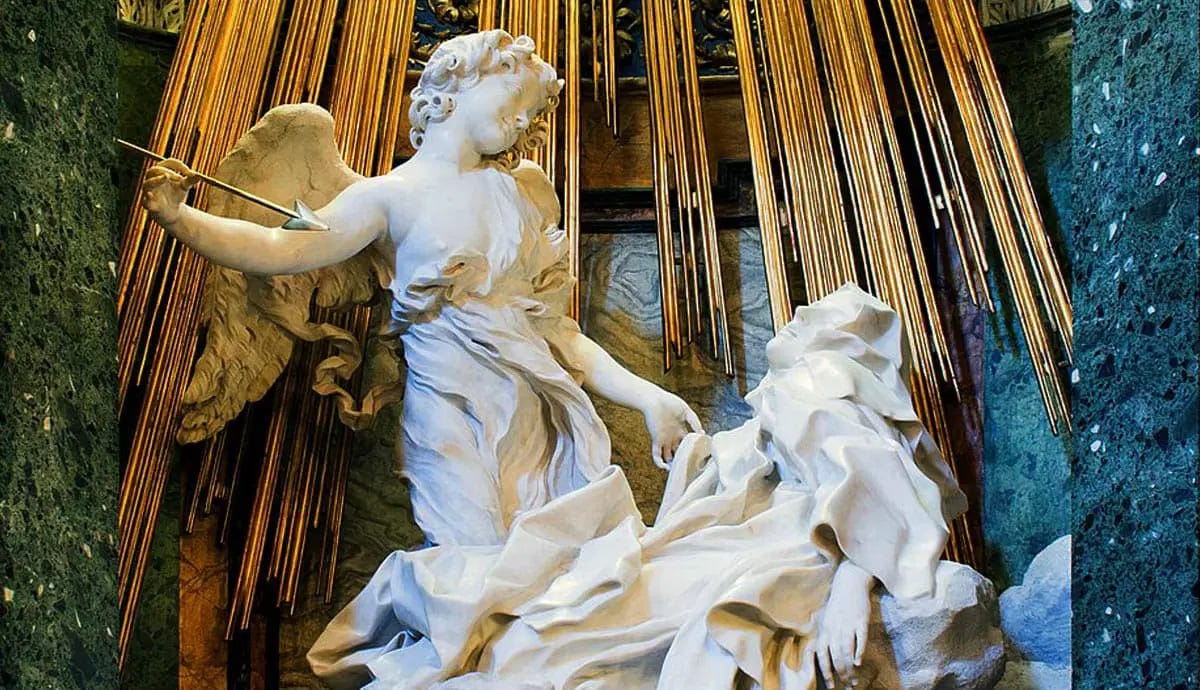When Our Soul Has Been Scattered: Are You Ready to Be Healed?

To imagine the soul is like imagining God Himself: as a spiritual essence, the soul can’t be accurately described in images and forms. Even so, there are times when we must speak in metaphor and comparison in order to try to understand even a small part of the mysteries of God.
With that in mind, we can follow the words of Teresa of Avila and compare the soul to an “interior castle.” In the center of this castle is a brilliant diamond: a seed waiting to sprout, a spark waiting to ignite. For Teresa, this is the innermost dwelling of the castle, where God Himself resides. St. Catherine of Siena described the thorough and complete melding of self and God “as the fish is in the sea and the sea is in the fish.” (Dialogue 2)
Our divine spark within can never be extinguished as long as we remain in this world. It can—and should—be ignited into a deliciously roaring flame, a bonfire of warmth and a benefit to all who draw near, but if left alone and untended, this spark will not die. It may become dormant, but like a seed waiting patiently in the ground for the spring sun, there is always the possibility of germination.
“If you are what you ought to be, you will like a fire in all the world! I’ll say no more.”
(St. Catherine of Siena, in a letter to her friend and disciple Stefano di Corrado Maconi)
Many spiritual traditions believe we can lose pieces of our soul. The idea is that these pieces shred from us during traumatic situations, or get pulled off like a fluff of cotton by people in our lives who have—in purposeful or inadvertent ways—hurt us. The more pieces of our soul we lose, the more fragmented and disjointed we become. This can result in restlessness, depression, addiction, a sense of being lost or of losing oneself, and even mental illness.
We’ve all felt a sense of soul loss at one time or another. Life happens—and so do hurts, injuries, and tragedies. It can take a great deal of effort to retrieve these damaged parts of ourselves—yet through prayer, determination, and the grace of the Holy Spirit, it can be done. However, no matter how much of ourselves we feel we may have lost, our souls remains intact, even if it doesn’t feel that way. We may lose parts of ourselves, but those parts are—through the grace of our Lord and the benefit of His divine mercy—always retrievable.
Our souls are made in the image of God, which is the place where healing occurs. Yet with healing comes fresh responsibilities to both our newly-strengthened selves and to others. In order to be truly healed, in order to expect our prayers to be answered, we must both be prepared for that healing and willing to face the results of what it will bring. Prayer isn’t static; it’s an action and a co-creation. As Thomas Aquinas said, “Prayer is the expression of hope” (Summa Theologiae II-II, Q. 17, a. 2, arg. 2). By praying, we aren’t—or we shouldn’t be—asking for God to do all the work. Rather, we’re asking for assistance.
Prayer is a dynamic request of working with God rather than expecting a magic wand of healing without pain. To gather our lost parts back together we must be prepared for action, for dynamic movement—and as with all great things, such as the excruciatingly painful but ultimately triumphant birth of a child—it takes our effort, and is worth the suffering. When we pray for our scattered parts to be made whole we must be prepared not only for the work it entails, but for the after-affects of that dynamic, co-creating healing grace.
Kenneth E. Bailey writes in his study Jesus Through Middle Eastern Eyes:
“When dealing with the man who lay for thirty-eight years beside the pool of Bethzatha Jesus asks, ‘Do you want to be healed?’ (Jn 5:6) The reason for the exam is to say to the paralytic, ‘You have survived as a beggar for years. If healed, you will have your livelihood stripped from you because no one will give to a healthy man. Are you ready for the new responsibilities that will come with healing?’”
When we ask to be healed, we’re also asking for an increase in talents (Luke 19:11-27). Are we prepared for that? If not, do we truly want to be healed? We must look deep within ourselves for the answer, because it’s usually not obvious. We keep uncomfortable or puzzling things hidden, preferring to face the easy and obvious ways rather than the complex and enigmatic paths. Challenges are difficult, both to face and to do, but the interest on the investment is so much more rewarding and fulfilling than taking the easy way out. Merely burying our talents achieves nothing. God gives us the graces we need to thrive in this world, and to share His mercy with others.
Ask and you will receive, yet be careful what you wish for. You just might get it, and the responsibilities thereof. Are you ready for something more, something infinitely better, something that requires Spirit-drive work? Are you ready for healing?
Those are the questions we must ask ourselves, in all honesty and truth.
“When Jesus saw him lying there and knew that he had already been there a long time, He said to him, “Do you want to be healed?”
(John 5:6)
Special Offer!
If you’re intrigued by the life of St. Catherine of Siena and want to learn more, my adaptation of her early life (part one of a two book series) is currently on sale when you purchase directly from my website.
Learn more about World Between Worlds: A Novel Based on the Early Life of Caterina, the Mystic of Siena.
You can also purchase on Amazon using my affiliate link.




Beautiful!!!
Sometimes the harder question isn’t “Can God heal me?” but “Am I ready for the life that healing will require?” Wholeness asks us to pick up the tools we once dropped, to shoulder the responsibilities we once avoided, and to live as a steward of the grace we’ve received. Healing isn’t the end of the story—it’s the beginning of the work.